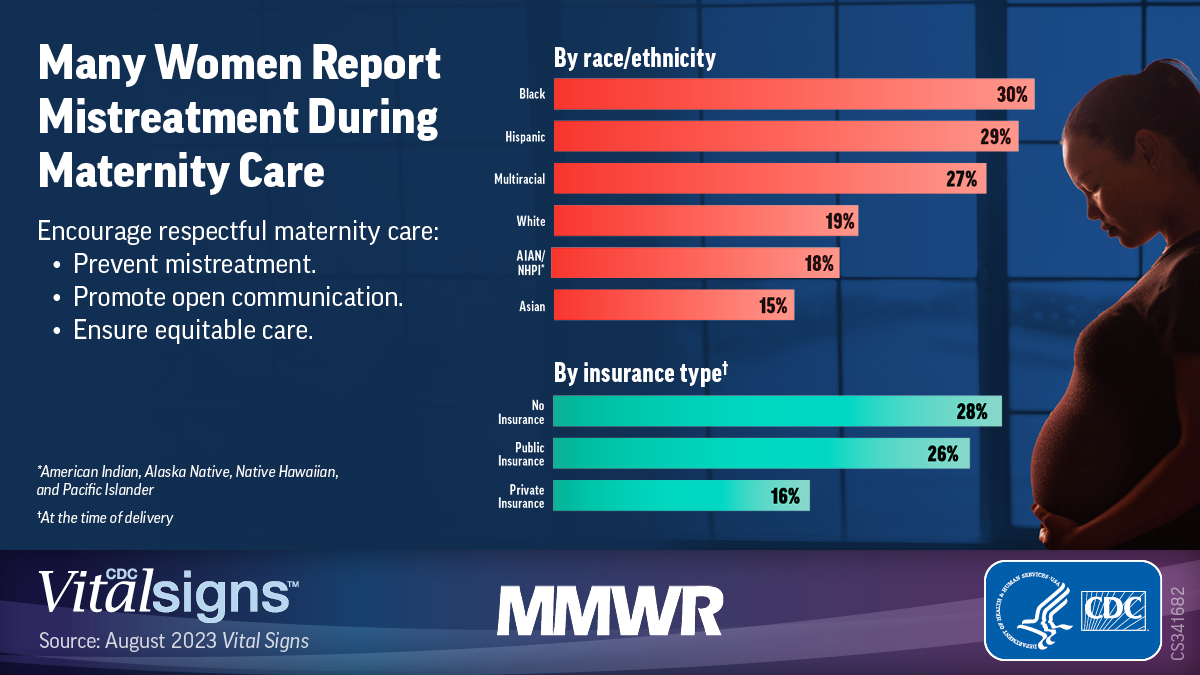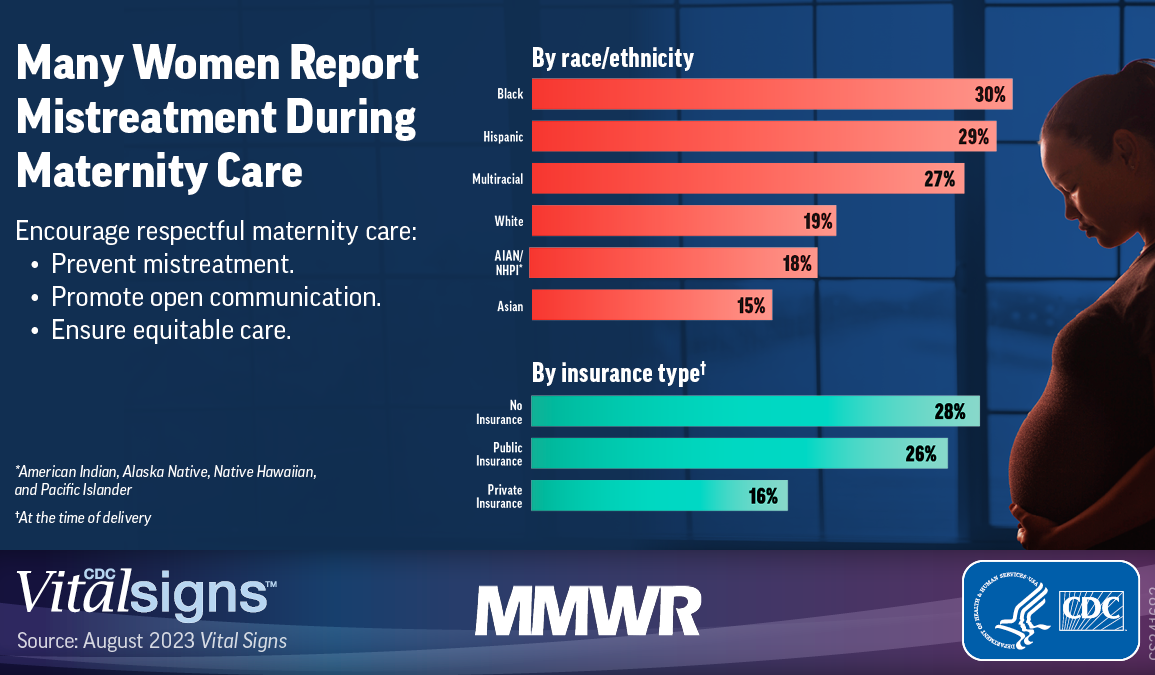
Discussion
Approximately one in five surveyed women reported mistreatment and approximately 30% reported discrimination during maternity care. These experiences were more common among Black, Hispanic, and multiracial mothers. Approximately one half of respondents reported holding back from discussing questions and concerns during maternity care. These findings highlight the gaps in delivering respectful maternity care and underscore the need for improvement. Respectful maternity care is a component of quality care and can be integrated into broader strategies to reduce pregnancy-related deaths (3).
Although approximately 90% of respondents reported satisfaction with maternity care received, this estimate was lower among those who experienced mistreatment. Women might report satisfaction with the maternity care received overall and concurrently recall discrete instances of mistreatment. Women who feel safe, supported, and respected are more likely to have positive pregnancy experiences (9). Higher patient-centered maternity care scores are associated with lower risk for pregnancy complications (10). Improving respectful maternity care can improve the experiences of mothers during pregnancy and delivery care.
Negative maternity care experiences might influence health care utilization; for example, experiences of racial discrimination are associated with less than adequate prenatal care and not receiving a postpartum visit (11). Evaluation of measures of respectful maternity care, the impact of interventions to improve respectful care, and the effectiveness of respectful maternity care interventions on maternal health outcomes in U.S. settings is needed (8). Studies outside of the United States have found that multilevel interventions that include approaches to improving health system practices and policies, addressing health care provider attitudes and behaviors, and engaging the local community have significantly improved respectful maternity care (12).
Health care systems can encourage a culture of respectful maternity care by implementing training for health care providers on recognizing unconscious bias and stigma, shared-decision making, improving interactions and communication with patients, and cultural awareness.§§§,¶¶¶,**** The AIM patient safety bundles, which are standardized practices used in birthing facilities to reduce severe illness and death, all include the provision of safe, respectful, equitable, and supportive care. Perinatal quality collaboratives, which are state or multistate networks of teams working to improve the quality of care for mothers and babies, have implemented quality improvement initiatives to address birth equity and improve respectful care.††††,§§§§ Routine measurement of patient experiences of respectful care can guide the development, implementation, and evaluation of initiatives to improve respectful care and their contribution toward improving patient outcomes (8).
Engaging patients with effective communication is a component of respectful care. Nearly one half of respondents reported holding back from asking questions or discussing concerns with their provider during maternity care. The most common mistreatment experience reported by mothers was a health care provider ignoring them, refusing their request for help, or not responding to their request for help. The Hear Her campaign¶¶¶¶ provides resources for pregnant and postpartum women and their support networks to share concerns with providers and to recognize urgent maternal warning signs that signal an immediate need to seek care. The campaign also promotes the need for providers to actively listen to their patients’ concerns and provide culturally appropriate, respectful care. Clinical organizations representing health care providers have highlighted the importance of providing respectful maternity care to improve outcomes for mothers and children by ensuring effective communication and shared decision-making with patients and their families and strengthening coordinated care teams (13).
This analysis found variation in mistreatment during maternity care by race, ethnicity, and insurance status at time of delivery. Black, Hispanic, and multiracial mothers reported the highest prevalences of experiencing any discrimination during maternity care. Experiences of racial discrimination are associated with pregnancy complications (14), and bias and stigma related to obesity and low income during obstetric care have been documented (15,16). The equitable delivery of respectful patient-centered maternity care has been proposed as one strategy to reduce disparities in maternal mortality (17). Recruitment and retention of providers with diverse backgrounds that mirror the population served, midwifery models of care, and doulas have been shown to improve patient experiences for racial and ethnic minority groups (2). For example, doula support is associated with higher levels of respectful care (measured by experiences related to decision-making, support, and communication during childbirth), particularly for mothers who are publicly insured and identify as members of certain racial and ethnic groups (18). Engaging community-based organizations can raise awareness of respectful care and identify opportunities to incorporate respectful care into initiatives aiming to reduce disparities in pregnancy-related deaths (2,19). Maternal mortality review committees can identify racism and discrimination during reviews of pregnancy-related deaths and develop recommendations for prevention (20), providing critical data for centering health equity and reducing disparities.
Limitations
The findings in this report are subject to at least seven limitations. First, the survey was opt-in, did not use probability sampling, and was not weighted; thus, these data are likely not representative of the U.S. birthing population. Second, the participation rate was <50%>
Implications for Public Health Practice
Improving respectful care is an important component of strategies to reduce pregnancy-related deaths. Health care systems can implement quality improvement initiatives to standardize care and support providers with training on discrimination, stigma and unconscious bias, cultural awareness, and communication techniques in the context of broader quality improvement initiatives. Health professionals interacting with patients at all points of maternity care play a role in improving patient experiences during maternity care and providing respectful maternity care equitably. Health communication campaigns and community engagement can include the perspectives of patients, families, and communities to raise awareness to incorporate the components of respectful maternity care, as well as how pregnant and postpartum women and their support system can communicate their questions and concerns. These campaigns and community engagement can also encourage providers to listen to and address their patients’ concerns.


